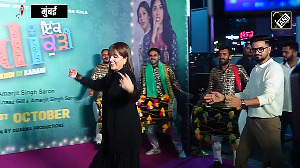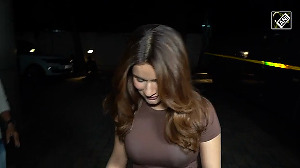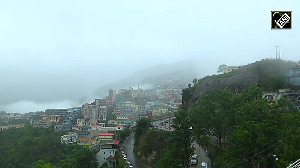Congress heavyweight A B A Ghani Khan Chowdhury, who passed away in Kolkata on Friday, had the rare distinction of being elected to the West Bengal assembly six times, besides making it to the Lok Sabha eight times between 1980 and 2004.
Known to his followers as 'Barkatda,' Khan Chowdhury first became power minister in the S S Ray government in 1972, during which he ensured jobs to hundreds of unemployed youth in his home district of Malda.
In 1980, he was elected to the Lok Sabha and was selected by then Prime Minister Indira Gandhi to look after the Energy department with additional charge of Irrigation.
Between 1982-84, Khan Chowdhury was railway minister and earned popularity for zonal projects, which provided youths of Malda district with jobs. He also handled the coal ministry.
Born in an aristocrat family in Malda on November 1, 1927, Khan Chowdhury was an important functionary of the All India Congress Committee. He became a member of the Congress Working Committee and Congress Parliamentary Party during 1981-85.
He became a AICC general secretary in 1985, and in the same year was inducted as Union minister of programme implementation, a portfolio he retained till 1987.
The Congress leader, who was appointed West Bengal Pradesh Congress Committee president during 1978-80, took the reins of the Pradesh Congress again for two consecutive terms between 1988 and 1990 and then from 1998 to 2000.
It was during his tenure as WBPCC chief that Khan Chowdhury sought to settle the internal bickering in the faction-ridden Congress in the state.
However, his efforts to bring about unity in the divided state party unit were construed by different factions as a move to 'perpetuate dispute' in the organisation. Factionalism in the state unit continued to rock Congress and ultimately led to the formation of the Trinamool Congress by Mamata Banerjee, although not during Khan Chowdhury's tenure as PCC chief.
His failing health notwithstanding, he continued to take active interest in party affairs and was even embroiled in controversy by inviting Mamata Banerjee to form a 'Mahajot' (grand alliance) to fight the last Lok Sabha elections against the Communist Party of India (Marxist)-led Left Front.





